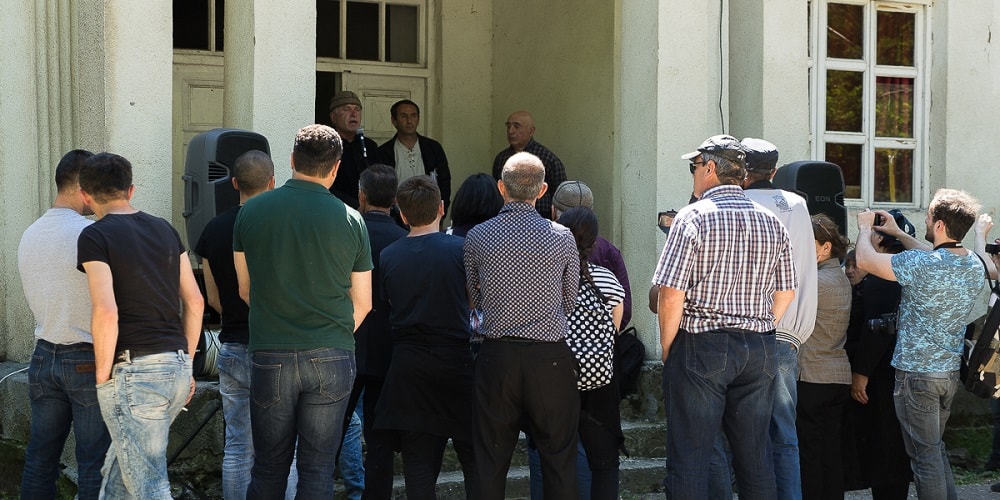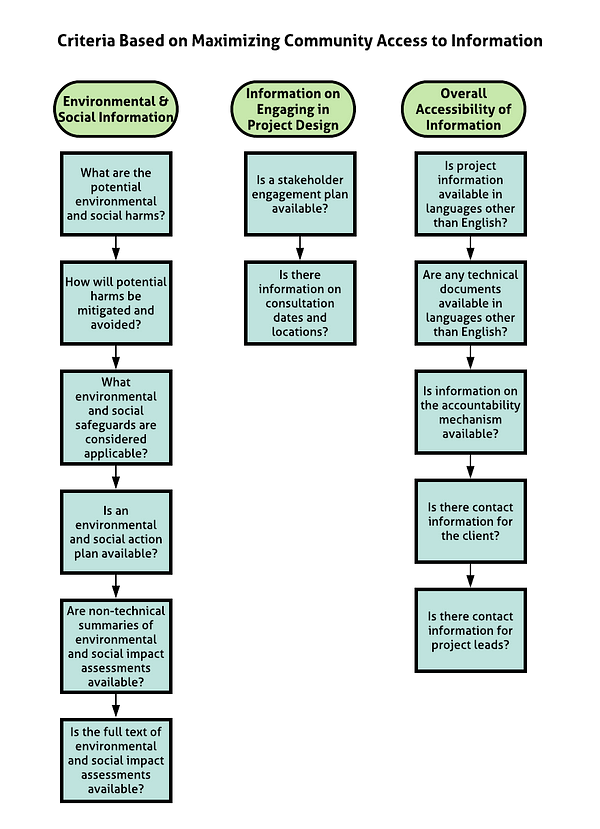The European Bank for Reconstruction and Development (EBRD) will soon conclude the revision of three policies central to the environmental and social governance of its projects: the Access to Information Policy, Environmental and Social Policy, and Project Accountability Policy. Together, these three documents will form the core of the institution’s protocols ensuring communities’ right to information, right to development, and right to remedy.
Ishita Petkar, Guest contributor, International Accountability Project (IAP) | 28 March 2019

Unfortunately, the EBRD’s proposed draft Access to Information Policy is the weakest link.
Having early access to information can mean the difference between a community learning about a project when the bulldozers arrive, and a community engaging with investors to co-design a project that avoids harm and creates real benefits. In practice, the right to access information goes far beyond simple information disclosure — it ensures that communities are equipped with the necessary information to substantively engage in the development processes that will ultimately shape their lives.
An analysis of the EBRD’s new Access to Information Policy, prepared by theInternational Accountability Project and CEE Bankwatch and co-signed by over 20 civil society organizations, indicates that the policy and practice of information disclosure at the EBRD falls considerably short of international best practice and does not align with international law. The draft policy is not people-centered and instead is excessively client-oriented. In addition, the policy carves out unreasonable amounts of discretionary power for the EBRD and its clients, lending itself to the circumvention of the policy’s own principles and commitments.
Communities have the right to know and understand the full scale of projects that may affect them, including both benefits and risks, so they can meaningfully contribute and ensure project plans align with their development priorities. To this end, the International Accountability Project and our partners are monitoring the online disclosure practices of several development institutions through the Early Warning System initiative. We track what project information is being disclosed, when it is being disclosed online, and ultimately, how accessible the information is for communities.
In Practice: How the EBRD Discloses Project Information
In the spirit of contributing to a more robust and people-centered Access to Information Policy, we have analyzed the EBRD’s disclosure practices for 195 projects proposed between November 1, 2017 and November 30, 2018. Our analysis does not evaluate compliance with Bank policies. Rather, our research seeks to assess current Bank disclosure practices against criteria which if met, would establish the foundation for the meaningful fulfillment of communities’ right to access information. These specific criteria are derived from our experiences working directly with communities affected by development bank projects, and our work to make information accessible through the Early Warning System.
The full analysis of disclosure practices can be accessed here. The dataset used for this analysis is also available for download. The analysis was shared in advance with the EBRD for comment and their response can be viewed here.

In the case of projects financed by the EBRD, many gaps remain that prevent communities from receiving the information they need. For example, only 6% of the 195 projects analyzed disclosed environmental and social action plans, a document rarely made publicly available that includes vital information like project mitigation measures and stakeholder engagement. Moreover, only 34% of the 195 projects analyzed provided a clear explanation of adverse environmental and social impacts, and only 48% shared measures to mitigate these risks.
Access to information is not only about the timely and early disclosure of documents. Often, the structure and language used can be overly complex, limiting community engagement. In our analysis, we found that only 20% of projects provided non-technical summaries of environmental and social impact assessments, and only 6% provided access to the full text – some with broken links.
The EBRD’s disclosure practice is particularly weak in providing access to information on how and when a community member can engage with a project. Only 14% of projects disclosed plans for stakeholder engagement and only 10% of projects included specific information on consultation dates and locations.
In addition to early access to information, communities require sufficient time to understand and evaluate project information, in order for their rights to be meaningfully fulfilled. As the interactive map above illustrates, the longest period of notice before an investment decision is made is 92 days for projects that are considered high risk, or Category A. However, this accounts for only 6% of projects. For projects that have the potential to pose significant risks to the environment and people, or Category B, information is disclosed an average of 17 days after the date the project is considered for approval, according to the EBRD’s own self-reported dates. Projects considered low risk, or Category C, are disclosed an average of 28 days before the Board date.
In response to the findings of the analysis, the EBRD noted that many projects were considered by the Board on an “authorized deferral basis”, where exceptions to the disclosure timeframe were granted, in line with the terms of the Bank’s current Public Information Policy. The specific reasons for granting deferrals were not disclosed in project documents. Based on the EBRD’s own data for 2017, the number of projects that meet this criteria is not insignificant.
In short, the EBRD reserves the right to carve out exceptions to its own access to information policy. Worryingly, the new draft policy continues in this vein, listing numerous overly broad, discretionary and vague exceptions. As a researcher from the Arab Watch Regional Coalition for Just Development observed during consultations on this policy in Cairo and Casablanca:
Despite the EBRD’s claim that its policy is based on default disclosure, the list of exceptions and language used in the draft policy suggests that in fact, disclosure is the exception.
It’s Time for A Better Offer
The EBRD operates in a region where space is often already restricted for communities to voice their concerns about projects, or even request access to information. This makes the Bank’s information disclosure practices even more critical. The EBRD must do more to meaningfully fulfill communities’ right to safe, timely and accessible information, early in the project cycle.
As Suma Chakrabarti, the current president of the EBRD noted in his vision for the Bank in 2016, “the Bank is instinctively too cautious still on public disclosure. It will need to make a better offer on public information disclosure and engagement to match the standards expected…”
We encourage the EBRD to use the opportunity afforded by this review process to strengthen its disclosure policies and practices, so that they better prioritize communities — the key stakeholders and purported beneficiaries of development.
Ishita Petkar is the Policy and Community Engagement Coordinator at the International Accountability Project (IAP) and is based in Washington D.C.
The Early Warning System ensures local communities and the civil society that support them, have verified information about projects likely to cause human and environmental rights abuses. Learn more: ews.rightsindevelopment.org
Note: The Early Warning System team strives to ensure the accuracy of the data. This analysis was shared with the EBRD before publication to allow opportunity for comment. While the Early Warning System team has made every attempt to research and present data accurately, it is often difficult to guarantee the complete accuracy of certain projects due to the lack of regularity and transparency in how various development institutions record and publish information. The Early Warning System team is committed to correcting any identified errors at the earliest opportunity.
Never miss an update
We expose the risks of international public finance and bring critical updates from the ground – straight to your inbox.
Tags: accountability | human rights | transparency
